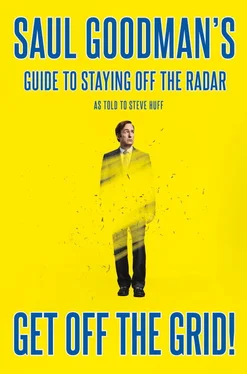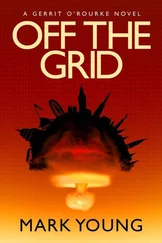Passive surveillance is everywhere: gas stations, supermarkets, laser tag arenas… at this point, the list is endless. It’s best to keep a pocketable disguise on hand in case you have to make like a tree and grab the first cab out of Dodge. If you’re trying to live a quiet new life, it’s a fine idea to have something on-hand anytime you’re out running. Make it a game! Pretend you’re a movie star avoiding the paparazzi. Only in your case, the shutterbugs might be wielding Tasers and warrants, or—even worse—an insatiable resentment over an unpaid debt and the machete to prove it.
Cell phone towers.One recommendation for someone who has dropped off the grid and changed their identity is to keep no cellular phone at all. That’s tough, but not impossible. You’ll find a way to live without customizable ringtones. If you can’t survive without the option of dialing up Mr Moviefone and living vicariously through film listings, another option is to pick up the most basic, disposable “burner” phone you can find. The old-fashioned clamshell flip phone is still readily available at the finest bodegas, dusty convenience stores, and many other somewhat-sketchy authorized retailers. There’s something to be said about smart phones being too “smart” for their own good. Those pocket NSA-receivers are constantly projecting metric tons of information about you, even when you’re not making a call or checking your e-mail. Some of that you could fix, but that isn’t common knowledge.
Most smart phones automatically embed the time, date, and geographic location into every photo you take. The geolocation is pretty easy to deactivate, but anyone casually analyzing an uploaded photo could still figure out a few things about you with that switched off. And cell phone towers are recording all the traffic that flows through their system, all the time—often including your approximate distance from the tower. Police have been known to track cell users from tower to tower, easily mapping a route from—in the case of a criminal—crime scene to hidey-hole. This is also true of burner phones, but at least you can swap them out frequently, and there’s no “family plan” tying your temporary number to a permanent physical address.
StingRays.I love a good visit to the aquarium. The soothing darkness, the playful sea otters, the gulping anchovies? But these StingRays aren’t the kind you can gently pet in the kiddie corner of your local marine center.
These StingRays track cell phones, but that’s damn sure not all they do. They can also function like a substitute cell phone tower for your little device to ping away at to its delight. The cops can set one up, then access your phone’s serial number, location, and more—they can even block calls by disrupting the phone’s ability to connect to its service provider. The main thing you need to know is that it’s a tool the police use, and chances are you’ve even had those invisible signals shooting out of your phone go through one at some point. This technology is on the ACLU’s radar, because these devices sweep up information not just about their targets, but also any innocent bystanders whose cell phones happen to be within range of the police’s trick tower.
The good news is StingRays are usually only deployed if there’s a concern about terrorism, civil unrest, or both. Here are two simple tips to keep you out of the StingRay’s barbed grasp: don’t be a terrorist, and don’t riot. How hard is that? Just stay away from parades and Black Friday sales. And good God, whatever you do, do not be a rioting terrorist. That’s a sure ticket to getting busted in a big way.
Communication is still a necessity, even if it’s just for the most basic stuff. If modern electronic messaging of any kind is so at the mercy of ECHELONs and StingRays, what choice do you have? I can’t get too technical, but I can point you in the direction of some stuff that might get you where you want to go.
Know how I’ve been saying this is almost like being a spy? Here’s where the overlap is obvious. So come on, Mr. or Ms. Bond, let’s step into the shop where Q left his gear laying around and see what we can dig up to help you. Let’s double back a little to the subject of…
Never tweet! or snap, or pin, or whatever…It might be pretty outdated in a lot of ways now, but in the movie Hackers one character says, “You could sit at home, and do like absolutely nothing, and your name goes through like 17 computers a day. 1984 ? Yeah right, man. That’s a typo. Orwell is here now. He’s livin’ large.”
That guy has a point and it’s truer now than ever. Hey, I know this is a theme, but there’s a gold-plated, indestructible reason it bobs back up again. Remember our case studies? The mystery dead guy on the Australian beach, Joey Newts, even Clark Rockefeller? None of them, not even the Clarkster, were in the same boat as you or me. See, unlike those mysterious characters, you and I are in an excellent position to have the Internet trip us right the hell into an 8 × 8 cell—even if you weren’t fleeing the criminal justice system in the first place. This is the most connected, chatty age imaginable. The age of the tweet. The age of endless photo albums digitally preserved for all eternity on Facebook, where perhaps one day our great-grandkids can go to find our lives memorialized every bit as boring as they seem right now.
Sure, it’s a glorious time! Gigantic databases of information everywhere, linked by glowing fiber-optic cables speeding information along at incredible speeds! Anything you need, at your fingertips. Give me my flying car and my robot maid, I’m all ready for this Jetsons kind of life.
Oh, no, wait—that all comes at a very steep price. If you want access to everything, you must allow yourself to be accessible, too. Anyone who has dropped off the grid and wants to stay gone has to take a very different tack when it comes to the Internet.
The idea of not using the Web at all is kind of weird. It also could conceivably set up an unfortunate attention-grabbing situation, where casual work acquaintances or neighbors figure out that woman in 3-A doesn’t seem to exist online, which sets off alarm bells. It’s okay to be a Luddite, as long as you’re believably Google-able.
We’ve chatted about how it’s mandatory that your old online life goes as dead as the poor soul whose social security number you’re currently using. That’s a given.
But say you need to have some kind of basic online presence, because even the most minimal lease agreement nowadays might have a line for “e-mail address.” It’s become one of those things people just automatically include on forms, presumably because no one likes to talk on the phone anymore.
Also, the Internet will remain incredibly valuable to you if you want to keep tabs on what’s going on with your old life. Not that you should! It’s safer to stay away, but supposing you glance through the online version of your local paper from time to time, there’s probably no harm—just don’t comment on any news stories. I don’t care if Mrs. Sarah Sabatini is claiming to have baked the most delicious pecan pie eight years in a row and you know it to be a fact that you held the blue ribbon at least twice in that range—bite your tongue, bite your fingertips, and close the page.
This all presents a problem, though, and that problem is spelled IP, or Internet Protocol Address. Every computer has an IP address, and it’s a string of digits that might look like this: 110.55.106.175 (that one’s fake). Depending on what Internet service you use—and several other factors—an IP can be traced right down to your front door.
Читать дальше












